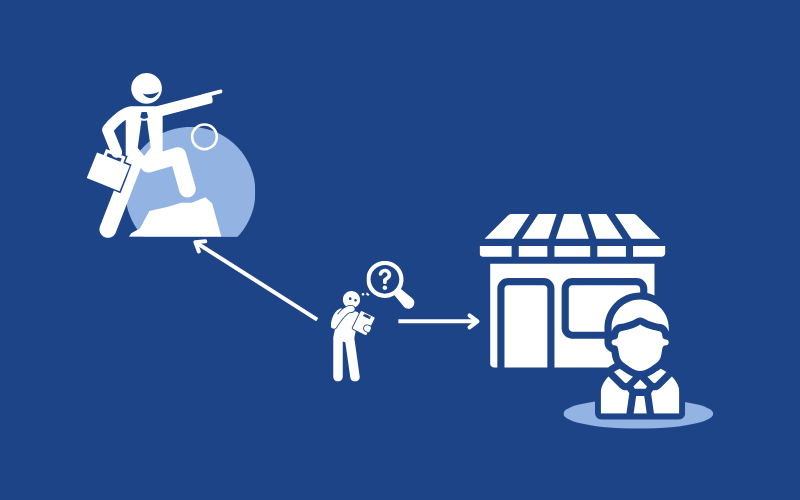Introduction
In the realm of business, two terms that are often used interchangeably are “entrepreneurs” and “small business owners.” However, these two roles hold distinct characteristics, goals, and mindsets. This article will delve into the differences between entrepreneurs and small business owners, shedding light on their respective roles in the business landscape.
1. What’s the Difference Between Entrepreneurs and Small Business Owners?
In the dynamic world of business, the terms “entrepreneurs” and “small business owners” are often used interchangeably, but they actually represent distinct roles with different motivations, approaches, and impacts on the economy. While both play pivotal roles in driving economic growth and job creation, there are fundamental differences that set them apart.
2. Defining Entrepreneurs and Small Business Owners
At its core, an entrepreneur is an individual who identifies opportunities, develops innovative solutions, and is willing to take calculated risks to bring new products, services, or business models to the market. On the other hand, a small business owner focuses on operating an established business, often catering to a local or niche market, and aims for stability and profitability.
3. Mindset and Risk-Taking
Entrepreneurs thrive on uncertainty and are comfortable taking risks. They possess a bold vision and are willing to invest time and resources into untested ideas. In contrast, small business owners seek stability and prefer to minimize risks. Their primary goal is to maintain a steady income and ensure the business’s survival.
4. Innovation and Creativity
Innovation is a hallmark of entrepreneurship. Entrepreneurs are driven by the desire to disrupt the status quo, introducing groundbreaking products or services that can change industries. Small business owners, while innovative in their own right, often focus on refining existing products or services within their niche.
5. Scale and Growth
Entrepreneurs have ambitions of rapid growth and scalability. They aim to expand their ventures on a larger scale, potentially reaching national or even global markets. Small business owners are content with moderate growth, focusing on serving their local community and building strong customer relationships.
6. Goal Orientation
Entrepreneurs are often motivated by the prospect of making a significant impact. They are more likely to pursue ventures that align with their passions and values, aiming to leave a lasting mark on the industry. Small business owners prioritize financial stability and may choose opportunities based on what provides a steady income.
7. Resource Allocation
Entrepreneurs are skilled at securing funding for their ventures, whether through venture capital, angel investors, or crowdfunding. They allocate resources strategically to fuel growth. Small business owners are more likely to rely on personal savings or traditional loans and focus on efficiently managing resources to maintain profitability.
8. Adaptability and Change
Entrepreneurs operate in rapidly changing environments and are quick to adapt to new trends and technologies. They embrace change as an opportunity. Small business owners may be more resistant to change, preferring to stick to proven methods that have worked in the past.
9. Impact on the Economy
Entrepreneurs play a crucial role in driving innovation, creating new industries, and generating high-impact jobs. They contribute to economic growth by introducing novel solutions. Small business owners, while also contributing to the economy, tend to create jobs on a smaller scale within their local communities.
10. Collaboration vs. Autonomy
Entrepreneurs often collaborate with diverse teams to bring their ideas to life. They value input from experts and investors. Small business owners typically maintain a more hands-on approach, often overseeing various aspects of their business personally.
11. Challenges Faced
Entrepreneurs face the challenge of securing funding, managing rapid growth, and navigating uncertainties. Small business owners deal with challenges related to local competition, operational efficiency, and maintaining customer loyalty.
12. Community Engagement
Small business owners are deeply connected to their communities, often forming strong bonds with local customers. Entrepreneurs might focus more on building a broader customer base through digital platforms.
13. Longevity and Legacy
Entrepreneurs may move on to new ventures once their ideas are established, often aiming to build a portfolio of successful projects. Small business owners may focus on passing down their businesses to future generations.
14. Conclusion
In essence, while entrepreneurs and small business owners both contribute significantly to the business landscape, their differences lie in their mindset, goals, approach to risk, and impact on the economy. Entrepreneurs are the trailblazers, introducing innovation and driving change, while small business owners are the stabilizers, providing vital services within their local communities. If you enjoyed this article make sure to check Spechy blog where we post hundreds of similar articles.
15. FAQs
- Q: Are all entrepreneurs also small business owners?
A: Not necessarily. While all entrepreneurs are business owners, not all of them operate small businesses. Some entrepreneurs aim for rapid scalability on a larger level. - Q: Can a small business owner become an entrepreneur?
A: Yes, if a small business owner decides to pursue innovative ideas, take risks, and scale their business significantly, they can transition into an entrepreneurial role. - Q: Do entrepreneurs only focus on profits?
A: While profits are important, many entrepreneurs are also driven by a desire to solve problems, create impactful solutions, and leave a lasting legacy. - Q: Can a business be both entrepreneurial and small?
A: Absolutely. A business can be innovative and entrepreneurial in its approach while still maintaining a small scale and focusing on a niche market. - Q: How do entrepreneurs and small business owners contribute to job creation?
A: Entrepreneurs create high-impact jobs through innovative ventures, while small business owners create jobs within their local communities, contributing to overall employment opportunities.


